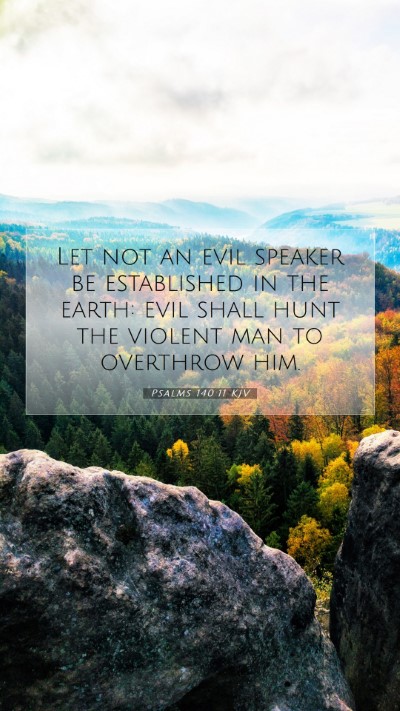Bible Verse Meaning and Commentary on Psalms 140:11
Verse: "Let not an evil speaker be established in the earth: evil shall hunt the violent man to overthrow him." (Psalms 140:11, KJV)
Understanding Psalms 140:11
Psalms 140:11 serves as a powerful reminder of the consequences that come with speaking evil and engaging in violent behavior. The psalmist expresses a plea for divine justice, imploring God to not allow those who spread malignancy to thrive. In this context, we see a reflection on the nature of evil, its prevalence in society, and the fervent hope for divine retribution against wrongdoing.
Insights from Public Domain Commentaries
Various commentators have explored the depth of this verse, providing insights into its implications for our understanding of evil and justice.
Matthew Henry's Commentary
Matthew Henry emphasizes the importance of the psalmist's prayer for the righteousness of God to prevail. He points out that the "evil speaker" signifies one who propagates falsehoods and engages in slanderous talk. Henry suggests that such individuals often find themselves entangled in their own schemes as they attempt to harm others. He highlights that evil, ultimately, will lead to the downfall of the violent and cruel-hearted.
Albert Barnes Commentary
Albert Barnes refers to the idea that the psalmist is asking God to prevent the establishment of those who engage in malice throughout the earth. Barnes explains that the term "violent man" refers to those who commit violence against others, indicating that their actions will ultimately lead to their own destruction. He elaborates that divine providence ensures that the wicked will not succeed in their endeavors, and their actions will invariably rebound upon them.
Adam Clarke's Commentary
Adam Clarke interprets this verse as a declaration of the inevitability of justice, where the evil speaker cannot remain unpunished. Clarke notes that the psalm reflects the historical context of the struggles faced by Israel against its enemies, and involves a prayer for divine intervention. He underscores that those who choose to be agents of violence will face the repercussions of their actions, aligning with the broader theological understanding of sin and its consequences.
Theological Reflections
Psalms 140:11 carries profound theological implications, particularly concerning the nature of evil and the workings of divine justice. The persistence of evil and the temptation to engage in malicious behaviors are recurrent themes throughout Scripture. Here's a deeper look into its meanings:
- The Nature of Evil: The verse brings to light the understanding that evil is an active force in the world. The "evil speaker" is not just a passive entity, but a dangerous force that seeks to influence others negatively.
- Divine Justice: There is comfort in the assurance that God sees all injustices. The psalmist's plea represents the universal human tendency to seek vindication in the face of oppression.
- Consequences of Violence: The reference to the “violent man” reiterates that actions have consequences. The verse serves as a cautionary reminder that violence will ultimately lead to self-destruction.
Practical Application and Reflection
As we explore the meanings of Bible verses, particularly Psalms 140:11, it becomes essential to consider their application in daily life. Every decision and action carries weight before God, and this verse encourages individuals to:
- Steer Clear of Malice: Strive to eliminate negative thoughts and speech in our lives, recognizing their potential harm.
- Advocate for Justice: Take a stand against injustices in society and support those who are oppressed, ensuring that truth prevails.
- Reflect on Personal Conduct: Continually assess one's attitudes and behaviors towards others, seeking to embody the virtues of kindness and peace.
Cross References
This verse resonates with several other scriptures that emphasize similar themes of justice and the consequences of evil. Here are some related verses:
- Psalms 56:5-7: "Every day they wrest my words: all their thoughts are against me for evil." This highlights the struggle against evil speech.
- Proverbs 11:21: "Though hand join in hand, the wicked shall not be unpunished: but the seed of the righteous shall be delivered." This reinforces the inevitability of justice.
- Galatians 6:7: "Be not deceived; God is not mocked: for whatsoever a man soweth, that shall he also reap." This reflects the principle of consequences for one’s actions.
Conclusion
Psalms 140:11 is a profound reflection on the nature of evil and the justice of God. The insights from renowned commentaries provide a deeper understanding of its implications for daily life and the moral choices we face. By internalizing these lessons, readers can gain clarity on not only interpreting this scripture but also applying it to their lives.


